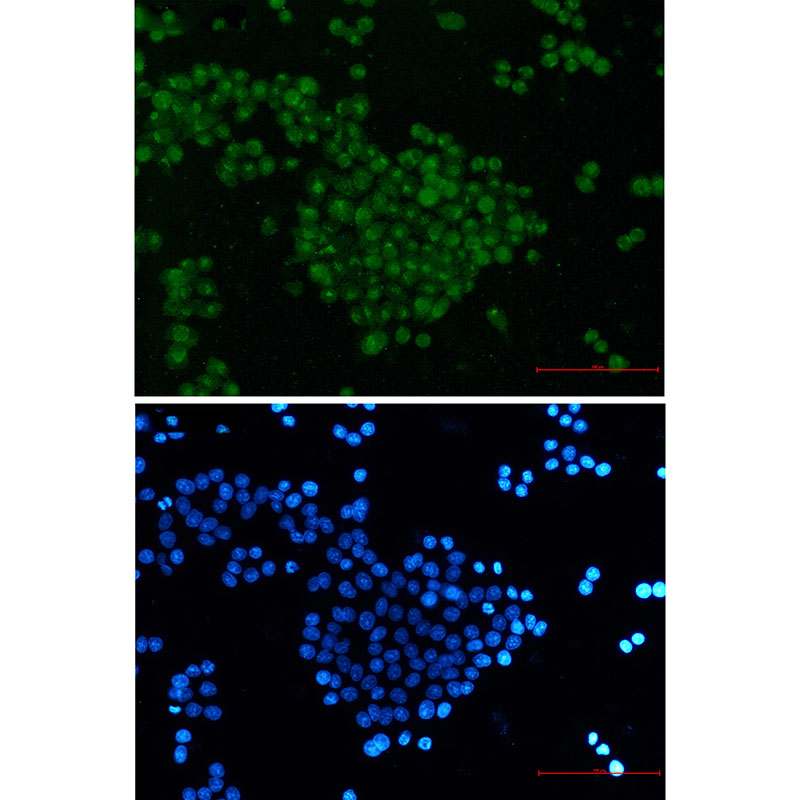
| WB | 1/500-1/1000 | Human,Mouse,Rat |
| IF | 咨询技术 | Human,Mouse,Rat |
| IHC | 咨询技术 | Human,Mouse,Rat |
| ICC | 1/50-1/200 | Human,Mouse,Rat |
| FCM | 咨询技术 | Human,Mouse,Rat |
| Elisa | 咨询技术 | Human,Mouse,Rat |
| Aliases | SKP2; FBXL1; S-phase kinase-associated protein 2; Cyclin-A/CDK2-associated protein p45; F-box protein Skp2; F-box/LRR-repeat protein 1; p45skp2 |
| Entrez GeneID | 6502 |
| WB Predicted band size | Calculated MW: 48 kDa; Observed MW: 48 kDa |
| Host/Isotype | Rabbit IgG |
| Antibody Type | Primary antibody |
| Storage | Store at 4°C short term. Aliquot and store at -20°C long term. Avoid freeze/thaw cycles. |
| Species Reactivity | Human |
| Immunogen | A synthetic peptide of human SKP2 |
| Formulation | Purified antibody in TBS with 0.05% sodium azide,0.05%BSA and 50% glycerol. |
+ +
以下是关于SKP2抗体的3篇代表性文献及其简要摘要:
---
**1. 文献名称**:*SKP2 is required for ubiquitin-mediated degradation of the CDK inhibitor p27*
**作者**:Nakayama, K. et al.
**摘要**:该研究通过Western blot和免疫共沉淀技术,利用SKP2抗体证实了SKP2作为SCF泛素连接酶复合物的核心组分,直接介导细胞周期蛋白p27的泛素化及降解,揭示了其在G1/S期转换中的关键作用。
---
**2. 文献名称**:*Overexpression of SKP2 correlates with poor prognosis in human lung adenocarcinoma*
**作者**:Masuda, T. et al.
**摘要**:研究通过免疫组织化学(使用SKP2特异性抗体)分析肺癌组织样本,发现SKP2在肺腺癌中高表达与肿瘤分级升高、患者总生存期缩短显著相关,提示其可作为肺癌预后的潜在生物标志物。
---
**3. 文献名称**:*Akt-dependent regulation of Skp2 stability and p27Kip1 turnover*
**作者**:Gao, D. et al.
**摘要**:该研究利用SKP2抗体进行Western blot及蛋白质稳定性实验,证明Akt信号通路通过磷酸化调控SKP2的蛋白稳定性,进而影响p27的降解,阐明了SKP2在肿瘤细胞耐药性中的机制。
---
**扩展参考**:
若需更多文献,可检索关键词“SKP2 antibody application”或关注近年研究,例如*Nature Cell Biology*或*Cancer Research*期刊中涉及泛素-蛋白酶体系统或靶向治疗的论文。
SKP2 (S-phase kinase-associated protein 2) is an F-box protein that acts as a substrate-recognition component of the SCF (Skp1-Cul1-F-box) E3 ubiquitin ligase complex. It plays a critical role in regulating cell cycle progression by targeting key cell cycle inhibitors, such as p27Kip1, p21Cip1, and p57Kip2, for ubiquitination and subsequent proteasomal degradation. This process promotes the G1/S phase transition, enabling cellular proliferation. Overexpression of SKP2 is frequently observed in various cancers and correlates with tumor aggressiveness, poor prognosis, and therapeutic resistance, making it a potential oncogenic marker and therapeutic target.
SKP2 antibodies are essential tools for studying its expression, localization, and function in both normal and pathological contexts. They are widely used in techniques like Western blotting, immunohistochemistry (IHC), and immunoprecipitation (IP) to investigate SKP2's interaction partners, regulatory mechanisms, and tissue-specific distribution. Research using these antibodies has highlighted SKP2's involvement in DNA damage response, senescence evasion, and metabolic reprogramming in cancer cells. Additionally, SKP2-targeting strategies, including small-molecule inhibitors and gene silencing, are being explored to restore cell cycle control in malignancies. The development and validation of specific, high-affinity SKP2 antibodies remain crucial for advancing both basic research and clinical applications in oncology.
×